Climate
change is a change in the Earth's climates at local, regional, and global
scales, as well as the consequences of these changes.
Since the pre-Industrial period (1850
onwards), the term "climate change" has been most used to describe
changes in the Earth's climate caused primarily by human activity, particularly
the burning of fossil fuels and the removal of forests, resulting in a
relatively rapid increase in carbon dioxide concentration in the atmosphere.
There are a
lot of factors that causes climate to change. But the most important driver of
climate change is global warming that is caused due to the green house gases
present in the environment like co2, methane, CFCs mainly due to anthropogenic
activities
CO2,
which is the great contributor of global warming, its concentration increases
in the environment due to burning of fossil fuel (coal, oil, gas) for energy
usage and for the needs of humans. The burning of fossil fuel dramatically
increases the amount of heat trapping gases which results in the increase in temperature
of the atmosphere results in climate change.
Effects:
Following are the effects that are caused due to the climate change:
- Threaten food production through increased unpredictability of precipitation,
- Contaminate coastal freshwater reserves
- Increase the risk of catastrophic flooding,
- More frequent and intense drought, storms, heat waves,
- Sea levels are rising, and oceans are becoming warmer.
- Declining water supplies, reduced agricultural yields, health impacts on peolple
- As climate change worsens, dangerous weather events are becoming more frequent or severe, we are already up to climate change, so responding to climate change involves a two-pronged approach.
Adaptation:
“Adapting refers to the climate change already in the pipeline- involves adjusting to actual or expected future climate”
Adaptation
refers to changes in ecological, social, or economic systems as a result of
existing or anticipated climatic stressors, as well as their ramifications or
consequences. It refers to adjustments in procedures, practices, and structures
that are made to mitigate the effects of climate change or to take advantage of
the opportunities that come with it. To put it another way, countries and
communities must create adaptation solutions and take action to respond to
current climate change consequences as well as plan for future repercussions.
Adaptation solutions come in a variety of shapes and sizes, based on a community's, business's, organization's, country, or region's specific situation. There is no such thing as a “one-size-fits-all” solution—adaptation can take many forms, from flood defenses to cyclone early warning systems to converting to drought-resistant crops to rethinking communication networks, company operations, and government regulations. Many countries and communities are currently taking measures to construct more resilient societies and economies, but far more action and ambition will be required to manage risks cost-effectively in the future.
Mitigation:
“Reducing emissions of and stabilizing the levels of heat-trapping greenhouse gases in the atmosphere”
It can done either by reducing sources of these gases (for example, the burning of fossil fuels for
electricity, heat or transport) or enhancing the “sinks” that accumulate and store these gases (such as the oceans, forests and soil).
The goal of mitigation is to avoid significant human interference with the climate system, and “stabilize greenhouse gas levels in a timeframe
sufficient to allow ecosystems to adapt naturally to climate change, ensure
that food production is not threatened and to enable economic development to
proceed in a sustainable manner
Consumer participation is required to mitigate global
climate change, and the qualitative data analyzed and revealed that there are
number of cognitive, behavioral, and structural barriers to voluntary
mitigation.
About the Author: Ramsha Hassan is currently pursuing
Bachelors in Environmental Sciences at Government College Woman University,
Sialkot. She is keen to write blogs for raising Environmental awareness.

0 Comments